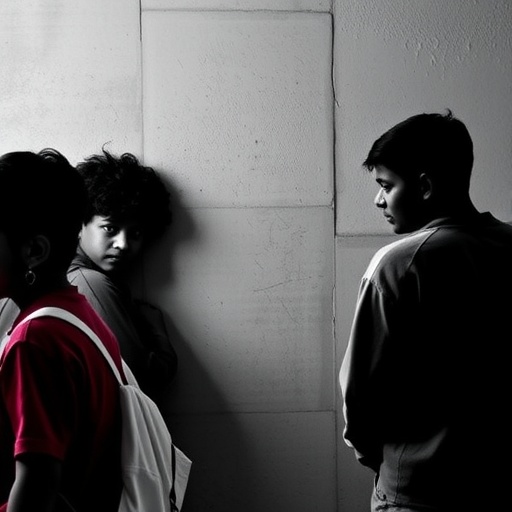In recent years, the critical issue of juvenile delinquency has attracted increasing attention from researchers and policymakers alike. Understanding the underlying causes behind youth delinquency is essential for establishing effective interventions that can support at-risk individuals. A noteworthy contribution to this ongoing dialogue is the forthcoming article from Tang, Jiang, and Deng, titled “Good Kids” or “Bad Kids”: An Action Research on Strengthening Juvenile Delinquents’ Social Bonds. In this comprehensive study, researchers delve into the complexities of social relationships and their influence on juvenile behavior, presenting a nuanced perspective on the classifications often ascribed to young delinquents.
The article is rooted in the belief that juvenile delinquents are not inherently “bad,” but rather trapped in a web of circumstances that may lead to negative behavior. Tang and colleagues aim to challenge the stigma surrounding these youths by emphasizing the importance of social bonds in the prevention of delinquency. This research proposes that fostering positive relationships can effectively alter the trajectory of a young person’s life, leading them away from crime and toward personal development.
The study encompasses a multi-faceted research design anchored in action research principles, which emphasize collaboration between researchers and community members. By integrating various methodologies, including qualitative interviews and quantitative assessments, the authors gather comprehensive data to support their hypothesis. This methodological approach not only enriches the findings but also ensures that the research is grounded in the realities experienced by juvenile offenders.
One key argument presented in the article is that social isolation often exacerbates the behaviors associated with delinquency. The authors underscore the critical role that peer influence plays in shaping a young person’s decisions and actions. By examining existing relationships among juvenile delinquents, the researchers identify patterns that reveal how negative influences can perpetuate cycles of crime. This insight drives home the necessity of intervention strategies aimed at building stronger, supportive networks around these individuals.
Moreover, the paper sheds light on several successful programs that have pursued similar objectives. Research shows that mentorship programs, community service projects, and positive recreational activities can effectively redirect a young person’s focus and energy. Tang and colleagues highlight case studies where such programs resulted in measurable decreases in criminal behavior, increased school attendance, and improved emotional well-being among participants. These findings suggest that structured environments and guidance can foster resilience and transformation.
In addition to exploring the impact of social bonds, the research also delves into the psychological aspects of juvenile delinquency. The authors articulate how feelings of rejection and abandonment can drive young people toward negative behaviors, creating a vicious cycle. By providing insights into the emotional struggles of these youths, the researchers advocate for a more empathetic approach to dealing with delinquency, one that prioritizes compassion and understanding over punitive measures.
The implications of this study extend far beyond the immediate context of juvenile justice. By reframing the narrative surrounding juvenile delinquents, the authors hope to inspire broader social change. Recognizing that young people thrive in positive environments leads to an important call to action: communities must come together to create supportive spaces that encourage personal growth. The article suggests that integrating social support systems into schools, neighborhoods, and families can foster an inclusive environment that combats the root causes of delinquency.
Attention is also drawn to the cultural factors that may contribute to juvenile delinquency. The researchers discuss how societal expectations and pressures can clash with personal aspirations, creating a breeding ground for discontent and criminal behavior. By addressing these cultural elements, communities may be better equipped to anticipate and prevent delinquency before it manifests.
Through their analysis, Tang and colleagues make it clear that the journey toward understanding and addressing juvenile delinquency must be deeply contextual. As such, the article emphasizes the importance of localized approaches that consider the unique characteristics of each community. The authors argue that what works in one neighborhood may not necessarily translate to another, highlighting the need for tailored interventions that resonate with the specific social dynamics at play.
Despite challenges, the authors maintain an optimistic outlook on the potential to improve outcomes for juvenile delinquents. Importantly, they articulate that meaningful change is already occurring in numerous communities worldwide, thanks to proactive engagement from schools, nonprofit organizations, and local governments. Such collaborative efforts are essential in building a more equitable society where all individuals, regardless of their past behavior, are granted the opportunity for redemption.
In summary, Tang, Jiang, and Deng’s forthcoming research represents a significant step forward in reshaping our understanding of juvenile delinquency. By advocating for a shift in focus from labeling and punishment to support and rehabilitation, this study offers valuable insights for educators, social workers, and policymakers alike. The authors’ findings serve as a poignant reminder that anyone, regardless of their past choices, can have a path toward a better future when provided with the necessary social support and guidance.
As the complexities of juvenile delinquency continue to evolve, this research invites further discourse on how society can foster greater understanding and nurturing of young people at risk. Only through collective effort can we hope to construct a brighter future, one that empowers the next generation to rise above their circumstances and emerge as positive contributors to their communities.
Subject of Research: Juvenile Delinquency and Social Bonds
Article Title: “Good Kids” or “Bad Kids”: An Action Research on Strengthening Juvenile Delinquents’ Social Bonds
Article References:
Tang, T., Jiang, Z., Deng, Z. et al. “Good Kids” or “Bad Kids”: An Action Research on Strengthening Juvenile Delinquents’ Social bonds.
Applied Research Quality Life (2025). https://doi.org/10.1007/s11482-025-10492-4
Image Credits: AI Generated
DOI: 10.1007/s11482-025-10492-4
Keywords: juvenile delinquency, social bonds, positive relationships, action research, rehabilitation




